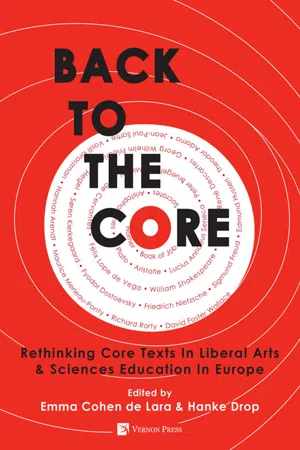
Back to the Core
Rethinking the Core Texts in Liberal Arts & Sciences Education in Europe
- English
- ePUB (mobile friendly)
- Available on iOS & Android
Back to the Core
Rethinking the Core Texts in Liberal Arts & Sciences Education in Europe
About this book
Whereas liberal arts and sciences education arguably has European roots, European universities have evolved over the last century to become advanced research institutions, mainly offering academic training in specialized disciplines. The Bologna process, started by the European Union in the late nineties, encouraged European institutions of higher education to broaden their curricula and to commit to undergraduate education with increased vigor. One of the results is that Europe is currently witnessing a proliferation of liberal arts and sciences colleges and broad bachelor degrees. This edited volume fills a gap in the literature by providing reflections on the recent developments in Europe with regard to higher education in the liberal arts and sciences. The first section includes reflections from either side of the Atlantic about the nature and aims of liberal arts and sciences education and the way in which it takes shape, or should take shape in European institutions of higher learning. The edited volume takes as a distinct approach to liberal arts and sciences education by focusing on the unique way in which core texts – i.e. classic texts from philosophical, historical, literary or cultural traditions involving “the best that has been written” – meet the challenges of modern higher education in general and in Europe in particular. This approach is manifested explicitly in the second section that focuses on how specific core texts promote the goals of liberal arts and sciences education, including the teaching methods, curricular reflections, and personal experiences of teaching core texts. The edited volume is based on a selection of papers presented at a conference held in Amsterdam, the Netherlands, in September 2015. It is meant to impart the passion that teachers and administrators share about developing the liberal arts and sciences in Europe with the help of core texts in order to provide students with a well-rounded, formative, and genuinely liberal education.
Frequently asked questions
- Essential is ideal for learners and professionals who enjoy exploring a wide range of subjects. Access the Essential Library with 800,000+ trusted titles and best-sellers across business, personal growth, and the humanities. Includes unlimited reading time and Standard Read Aloud voice.
- Complete: Perfect for advanced learners and researchers needing full, unrestricted access. Unlock 1.4M+ books across hundreds of subjects, including academic and specialized titles. The Complete Plan also includes advanced features like Premium Read Aloud and Research Assistant.
Please note we cannot support devices running on iOS 13 and Android 7 or earlier. Learn more about using the app.
Information
& Sciences Education in Europe

In the Americas: Vernon Press 1000 N West Street, Suite 1200, Wilmington, Delaware 19801 United States | In the rest of the world: Vernon Press C/Sancti Espiritu 17, Malaga, 29006 Spain |
Table of contents
- Notes